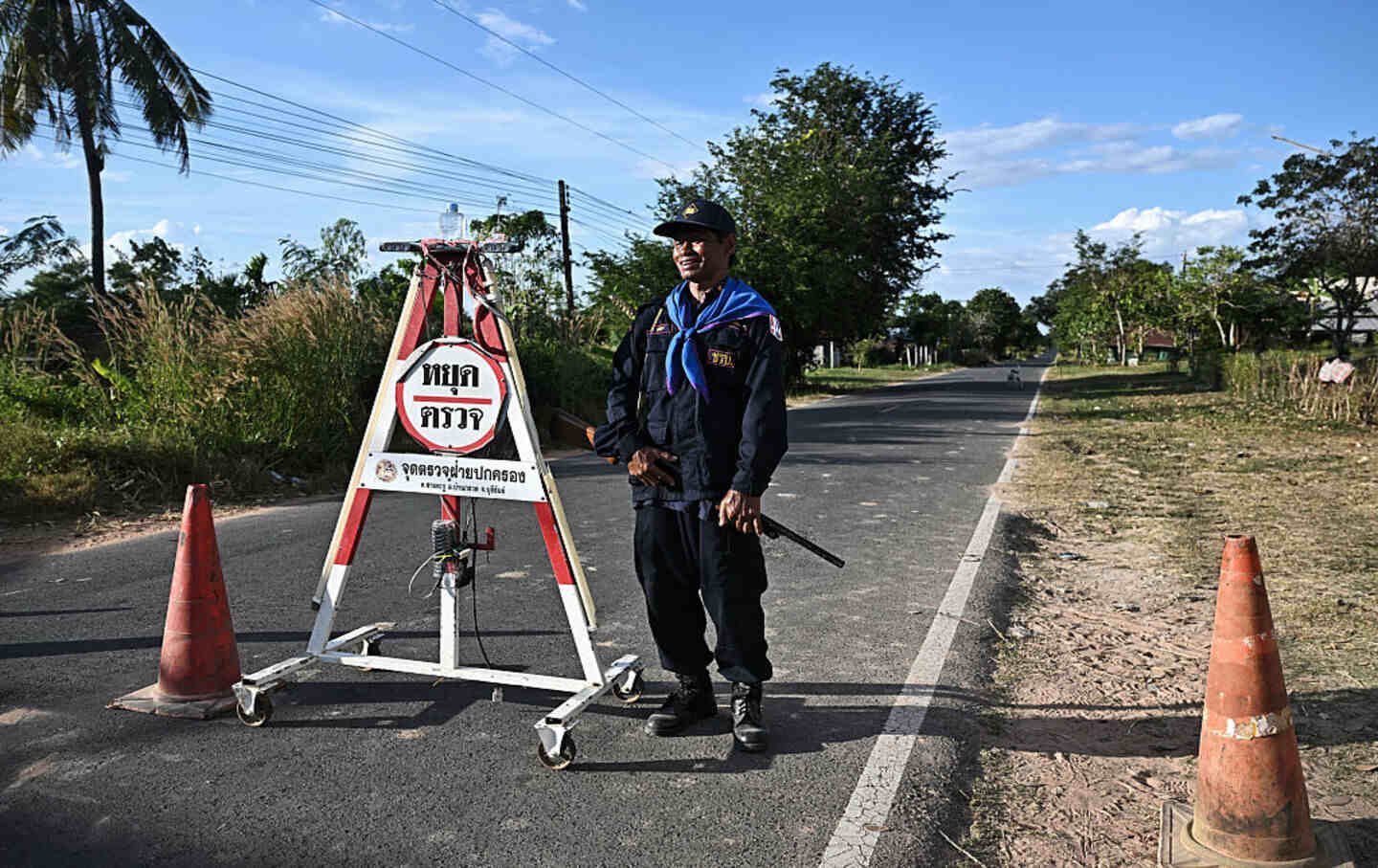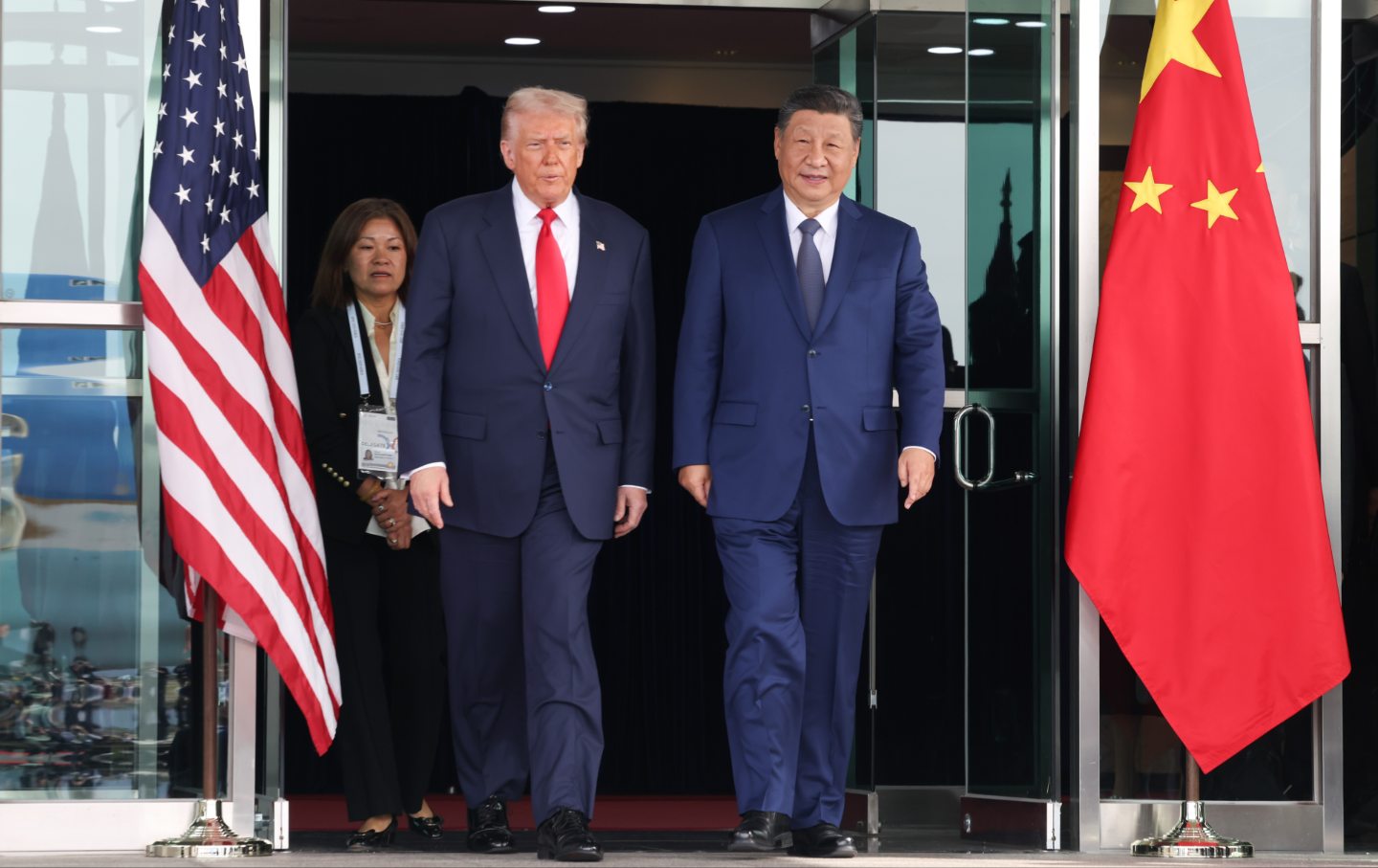A Failed Coup in Bolivia, Protests in Kenya, and Assange’s Plea Deal
On this episode of American Prestige, headlines from around the globe.

Here's where to find podcasts from The Nation. Political talk without the boring parts, featuring the writers, activists and artists who shape the news, from a progressive perspective.
On this week's American Prestige news roundup: in Palestine/Israel, a grim Save the Children report on Gaza (0:30), Netanyahu again rebuffs a ceasefire and suggests a new phase of the operation (2:41), a new court ruling on ultra-Orthodox Jews’ conscription (7:14), and Israeli finance minister Bezalel Smotrich again pushes West Bank annexation (10:17); Lebanon is still on edge as the US—while hosting Israeli minister of defence Yoav Gallant—warns Hezbollah that it will not stop Israel from attacking (13:00); a preview of Friday’s presidential election in Iran (17:06); a disputed weapons test in the DPRK/North Korea (20:50); rumblings of an imminent coup in Burkina Faso (22:38); widespread protests break out in Kenya, leading President Ruto to back off of the controversial tax legislation (26:28); deadly attacks in Dagestan (29:47); the espionage trial of Wall Street Journal reporter Evan Gershkovich begins in Russia (32:02); a failed coup attempt in Bolivia (33:16); Kenyan police arrive in Haiti to face armed groups (36:23); and Julian Assange has reached a plea deal with the United States (38:27).
Advertising Inquiries: https://redcircle.com/brands
Privacy & Opt-Out: https://redcircle.com/privacy

Juan Mario Paulzen Sandy and Anibal Aguilar Gomez are escorted by policemen following their arrest, accused of being accomplices of now-dismissed army chief General Juan Jose Zuniga, after he led a military movement that attempted to seize the government palace by force in La Paz, on June 27, 2024.
(Aizar Raldes / AFP via Getty Images)This week’s American Prestige news roundup starts as usual with Palestine/Israel: Save the Children issues a grim report on Gaza (0:30); Netanyahu again rebuffs a cease-fire and suggests a new phase of the operation (2:41); a court rules on ultra-Orthodox Jews’ conscription (7:14); and Israeli finance minister Bezalel Smotrich again pushes West Bank annexation (10:17). Lebanon is still on edge as the US—while hosting Israeli minister of defense Yoav Gallant—warns Hezbollah that it will not stop Israel from attacking (13:00). We preview Friday’s presidential election in Iran (17:06). North Korea stages a disputed weapons test (20:50). There are rumblings of an imminent coup in Burkina Faso (22:38). Widespread protests break out in Kenya, leading President Ruto to back off of controversial tax legislation (26:28). Dagestan is the scene of deadly attacks (29:47). The espionage trial of Wall Street Journal reporter Evan Gershkovich begins in Russia (32:02). A coup attempt fails in Bolivia (33:16). Kenyan police arrive in Haiti to face armed groups (36:23). And Julian Assange has reached a plea deal with the United States (38:27).

Here's where to find podcasts from The Nation. Political talk without the boring parts, featuring the writers, activists and artists who shape the news, from a progressive perspective.
Derek welcomes Matt Lech to the show to bring you the news while a sick Danny convalesces. This week: Trump pushes U.S. oil companies to reenter Venezuela and outlines plans for a long-term U.S. takeover of the Venezuelan oil industry (1:34); opposition leader Maria Corina Machado presents Donald Trump with her Nobel Peace Prize medal (7:01); Southern Transitional Council leader Aidarus al-Zubaidi flees Yemen as the group fractures amid competing leadership claims (8:50); Somalia cuts ties with the United Arab Emirates following the latter’s support for Somaliland and the evacuation of Yemeni separatist leaders through Somali territory (12:05); the second phase of the Gaza ceasefire begins as Israel continues to restrict humanitarian aid (14:27); UK Palestine Action prisoners conduct hunger strikes as part of a broader campaign against repression and arms manufacturing, with Matt relaying a statement from the group (18:11); Sudan’s military government announces its return to Khartoum while preparing a major operation against the Rapid Support Forces in Darfur and Kordofan (21:22); China records a $1.2 trillion trade surplus despite U.S. tariffs (24:09); Japan’s prime minister moves toward snap elections amid high approval ratings and ongoing political instability (26:30); the UN reports 2025 as the deadliest year for Ukrainian civilians since 2022 (28:40); American, Danish, and Greenlandic officials meet in Washington as Trump continues to press claims over Greenland (31:06); the Trump administration halts immigrant visa processing for 75 countries (33:15); and the New York Times reports on possible U.S. war crimes involving the use of disguised military aircraft in “anti-smuggling” operations (34:23). Derek then speaks with Negar Mortazavi, journalist and host of The Iran Podcast, about the causes, trajectory, and implications of Iran’s recent nationwide protests (37:11). Find more of Matt’s work over at Left Reckoning, The Majority Report, and The Jacobin Show. Here is the complete statement from UK Palestine Action.
Advertising Inquiries: https://redcircle.com/brands
Privacy & Opt-Out: https://redcircle.com/privacy






